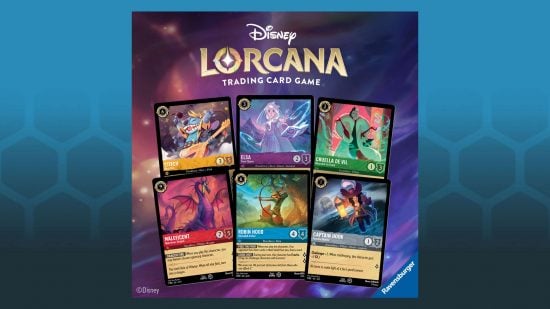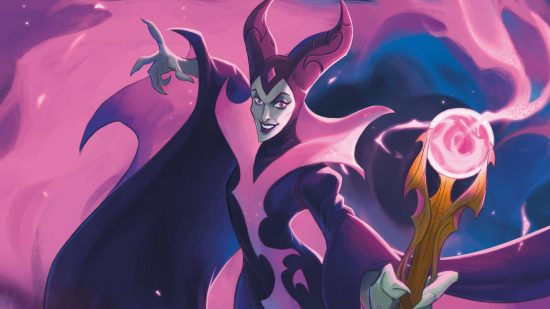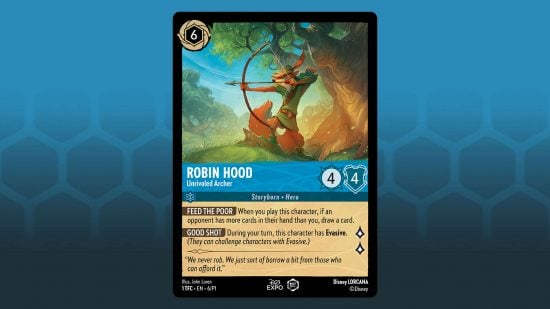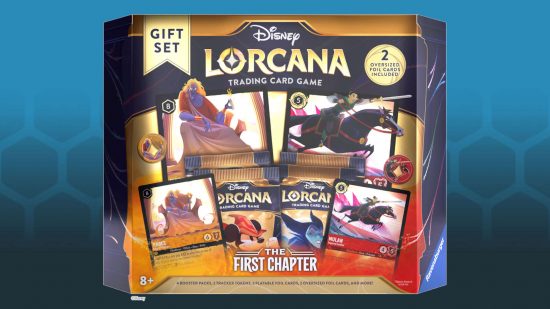Trading card game maker Upper Deck announced on June 7 it was suing board game publisher Ravensburger, accusing both the firm and former Upper Deck contractor Ryan Miller of stealing a game design and turning it into the upcoming Disney Lorcana TCG. Wargamer spoke to Anna Poulter-Jones, a lawyer with UK firm Sheridans who specializes in the games industry, to help decode the Disney Lorcana lawsuit.
The stakes are high. Among other calls for reparation, Upper Deck has requested a court injunction against Ravensburger, which would prevent them releasing the game on the planned Disney Lorcana release date of August 18 – or indeed, at all, if the suit were to go in Upper Deck’s favor.

In a complaint filed with the Superior Court of the State of California, Upper Deck claims it contracted Miller as the lead designer on an original TCG, Rush of Ikorr. It alleges that Miller then took his work on the game with him to a new role at Ravensburger, turning it into Disney Lorcana.
Poulter-Jones says that despite intellectual property being central to the dispute, copyright infringement has very little to do with it.
“The gist of their complaint is breach of contract [and] breach of confidentiality”, Poulter-Jones states. An assortment of claims orbit around that central concern; claims that Ravensburger induced Miller to break his contract, claims of fraud, claims of unfair dealing, claims that Miller breached fiduciary duty (his responsibility to act in Upper Deck’s best interest), and more.

Why take such a scattershot approach to the complaints? “It’s a common approach to throw in as many causes of action as you can and see what sticks”, Poulter-Jones says. But simple copyright infringement – profiting from someone’s original creative work without a license to do so – is not among the complaints raised.
“The lawyers will be aware that to base the whole complaint around demonstrating copyright infringement could be more difficult”, Poulter-Jones says. That’s because “game mechanics in and of themselves don’t attract copyright protection”.
Copyright law for game mechanics is similar to copyright law for recipes. In US law, a plain series of instructions can’t be copyrighted, but the specific expression of those instructions can be. That’s why every food blog and recipe website starts with a long essay about the author’s childhood or the holiday when they first ate the food in question.
So while a written rulebook has a copyright, a set of rules, in the abstract, does not. It could be very difficult to prove that a set of rules, however similar to an existing set, constitutes copyright infringement. But it might still serve as evidence that other laws have been broken.
“Upper Deck do make reference throughout to stolen intellectual property, pilfering the game design”, Poulter-Jones says, but adds that “the focus is on breach of contractual provisions prohibiting Miller from using or disclosing Upper Deck’s intellectual property and confidential information, rather than strict copyright infringement”.
This may still be difficult to demonstrate. “An employee or contractor can’t use or disclose confidential information that was obtained in the course of employment” Poulter-Jones says. But that’s only during the period of the contract: “After that contract has ended it becomes more difficult to enforce, particularly with respect to learned information that’s in the contractor’s head. It’s hard to impose restrictions on a person’s learned knowledge”.
This is why many companies include non-compete clauses in their contracts; if you can’t stop a former employee from using what they’ve learned with you, you can make them agree not to work for a competitor. “There is increasing pushback on the inclusion of non-compete clauses in employment/contractor agreements, so when they are included they tend to be of limited duration”, Poulter-Jones adds. Notably, Upper Deck’s complaint doesn’t reference any such non-compete clause.
Upper Deck’s whole case may hinge, then, on being able to demonstrate that Miller took written documentation with him from Upper Deck to Ravensburger, and will get a lot harder if Upper Deck has to refer to information that Miller carried only in his head. “It’s not a cut and dried case” in favor of either firm, Poulter-Jones says.
Lisa Krueger, Senior Communications Director of Ravensburger North America provides this statement: “We at Ravensburger stand behind the integrity of our team and the originality of our products. The baseless claims filed this week are entirely without merit, and we look forward to proving this in due time. In the meantime, our focus continues to be on developing and launching a fantastic game in August.”

Poulter-Jones is careful to note that there are limits to what she can conclude with authority about the case. Though there is a lot of commonality between UK and US intellectual property law, “there might be certain points that are quite specific to US law”, she says. Further, the suit has been “put forward by lawyers who know all the details: the [complaint] is a summary of the key details. There will be a lot behind the scenes that we’re not aware of”.
This could be the start of a very long and expensive legal action for both parties. Trading card game fans are used to seeing large sums in headlines along with their games of choice, but even the most expensive rare Pokémon cards or absurdly pricey MTG cards like the MTG Lord of the Rings ‘One Ring’ card will pale in comparison with the legal bill of whoever loses this case, assuming it’s not settled out of court.
Check out our guide to MTG Arena Codes if you’d like to enjoy some free packs and cards at the publisher’s expense.


